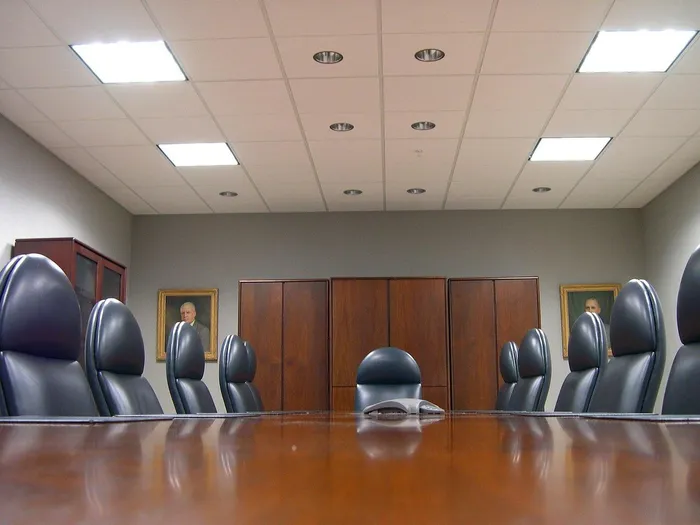
In the evolving architecture of corporate governance, there is often confusion between having a seat at the table and truly discharging the duties that come with it, says the author.
Image: Pixabay
You can sit on a board and still fall short of leadership.
In the evolving architecture of corporate governance, there is often confusion between having a seat at the table and truly discharging the duties that come with it.
Being a director is not ceremonial; it is a fiduciary commitment. One that demands more than occasional attendance and rubber-stamping decisions. It demands diligence, judgement, independence, and above all, accountability. Too often, we invoke the language of “oversight” or “strategy” in vague terms. But what does it actually mean to govern well?
South African company law sets the standard with quiet clarity. Directors must act honestly and with the care and skill expected of someone entrusted with protecting the interests of others. They must remain free of conflicts, act in the best interests of the company and make informed decisions. It is not the avoidance of mistakes that protects directors. It is the demonstration of proper conduct and reasonable judgement.
When directors fall short of this, consequences follow. And those consequences are not theoretical.In 2017, the Steinhoff International scandal sent shockwaves through boardrooms across the country. What was once considered a darling of the JSE unravelled into a cautionary tale of unchecked ambition, accounting irregularities and weak board oversight. While much of the public narrative focused on Markus Jooste and the executive team, scrutiny inevitably turned to the board. What did the non-executive directors know? When did they know it? And did they ask the right questions, or any questions at all?
A forensic investigation found failures in financial oversight, with billions in overstated profits and fabricated deals across subsidiaries. The board had approved complex transactions it did not fully understand, and in some cases, did so without full disclosure from management. But here lies the critical point: ignorance is not a defence. Directors are expected to take reasonable steps to remain informed. If a director lacks financial literacy or sectoral knowledge, it is their duty to acquire it, or to probe until they understand. The law does not shield those who look away.
Several Steinhoff directors later resigned, reputations tarnished, as the company’s value collapsed and lawsuits mounted. Whether or not each individual director was complicit in fraud became secondary. What mattered was whether they had fulfilled their duty of care. And for many, the record showed they had not.
Contrast this with a very different, but equally telling case: Capitec Bank, which in 2018 faced an aggressive short-seller report accusing it of reckless lending and misleading financial statements. The board was thrust into a high-stakes moment. But instead of panicking, Capitec’s leadership responded with transparency, data and composure. They engaged the regulator, issued detailed counterstatements and clarified the business model to the public. The regulator’s subsequent investigation found no evidence of wrongdoing, vindicating the board’s approach. Within weeks, investor confidence began to return.
What set Capitec apart was not luck, but governance. Long before the crisis, the bank had invested in a strong board culture, characterised by diversity in expertise, rigorous processes and shared values. Directors were regularly briefed on emerging risks, encouraged to challenge assumptions and given access to independent advisors. So, when the moment came to exercise judgement under pressure, they were ready. They acted with the care, skill and diligence that governance demands and the law respects.
These two cases reveal a profound truth about directorship: liability hinges not on the decisions themselves, but on how they are made. South African law recognises this. Directors who act in good faith, are free from conflict, are properly informed and act in the best interests of the company remain protected, even if the outcome of their decision proves flawed. This is the essence of the Business Judgment Rule. While the rule rewards rigor rather than results, true rigor demands more than mere rubber-stamping. It offers no blanket immunity, only fairness to those who demonstrate they properly applied their judgement and followed due process.
But herein lies the trap: too many directors confuse consensus with sound judgement, and compliance with conscience. They nod through meetings, approve budgets they haven’t read and outsource thinking to consultants or executives. In so doing, they betray not only the company, but also the very purpose of the board.To govern is to care enough to confront. To be curious. To demand clarity. And to accept that duty is not always convenient. It is the director who speaks when others stay silent that earns the law’s protection, not the one who watches passively and signs off anyway.
There is no shortage of charters or codes. What we lack, at times, is courage. Courage to ask the uncomfortable questions, to speak when silence is safer, to act when others defer and to hold the line when it would be easier to look away.
As we reflect on what it means to serve on a board, particularly in a climate of mounting public scrutiny, economic pressure and stakeholder activism, it becomes clear that the title “director” must be reclaimed as a moral imperative, not just a legal obligation. Why? Because when things go wrong, and they often do, the question will not be whether you were in the room. The question will be what you did when you were.In considering the true responsibility of directorship, I offer these questions for reflection:
⦁ Do you understand the company’s risks well enough to explain them to a stranger?
⦁ Are you engaging with management critically, or merely observing from a distance?
⦁ Can you evidence how your decisions have been made, and why?
⦁ And, perhaps most importantly, if your decisions were challenged in hindsight, would they reflect good faith and sound judgement?Because directorship is not a shield. It is a spotlight. And it shines brightest when things go dark.

Nqobani Mzizi is a Professional Accountant (SA), Cert. Dir (IoDSA) and an Academic.
Image: Supplied
Nqobani Mzizi is a Professional Accountant (SA), Cert.Dir (IoDSA) and an Academic.
** The views expressed do not necessarily reflect the views of IOL or Independent Media.
BUSINESS REPORT